Deborah J. Ross's Blog, page 33
December 10, 2021
Short Book Reviews: Composite Creatures, by Caroline Hardaker
Composite Creatures, by Caroline Hardaker (Angry Robot)
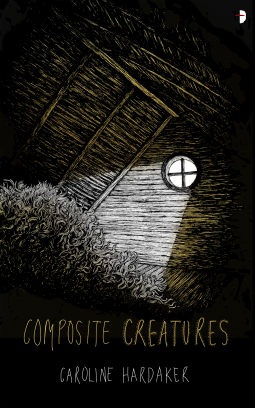
This is a very strange book, but strange in the sense of mind-bending speculative fiction about a dystopian future, executed with great skill and, most of all, respect for the reader’s intelligence. In an era when all too many novels spoon-feed information, practically hammering the reader’s attention, Caroline Hardaker builds her world, characters, and mysteries layer by intricate, subtle layer. She invites us into a world that is grim but recognizable, one in which pollution and habitat destruction have resulted in the loss of most animals city dwellers might see, including pets. Governmental institutions are slowly being replaced by private ones, notably Easton Grove, and the author doesn’t tell us upfront what it does. Norah, the viewpoint character, has signed up with Easton Grove and has been matched with Arthur, a notable novelist. She’s understandably nervous about their first date in a bizarre courtship by corporate decree, but all goes well, they set up housekeeping together, and soon a cardboard box arrives. Inside is a creature that sounds awfully like a cat. A pet!I thought. They’ve gone through this rigorous process and qualified to parent a pet!
Little did I know that the strangeness was just beginning. As Norah becomes increasingly obsessed with “Nut,” as she has named the creature, Arthur grapples with crippling writer’s block and their network of friends gradually disappears. Then Nut’s fur falls out, Easton Grove increases its surveillance, and Arthur sports a new tooth, wrenched from Nut’s jaw.
In places, Composite Creatures wanders over the border into horror, but I don’t think it belongs properly to that genre. It’s edgy, complex, layered dystopian science fiction, with the emphasis on the inner lives of the people caught up in the Kafka-esque world. It isn’t an easy read or a pleasant one, but is nonetheless rewarding. Norah and Arthur are so much like ordinary people, and we are all vulnerable to the intense seductions and pressures they succumb to.
December 6, 2021
I Failed To Save That Chapter: What To Do When You've Lost Your Work
 writing. Here's how I responded.
writing. Here's how I responded.What a colossal bummer!! There's no getting around how frustrating and just plain maddening it is to lose work. I used to do that with some regularity back in the era when I had to manually save everything to disk/ette. I still have a 5 1/4" floppy that no one can read because of the misalignment of the drive when I saved it -- that I am sure contains brilliant and irreproducible words. And I just did it last year by overwriting a chapter and saving it in the cloud.
So, having been around the block on losing work enough times I know a couple of things.
One, as I began with, is that I'm going to feel wretched and desperate and aggravated no matter what I tell myself.
Two, THIS WILL PASS. Two sub-two, I won't be ready to rewrite until I am ready. Sometimes that's an antidote to Great Flaming Balls of Upset, but more often I need to go away and calm down. Do something else, like making bread by hand or chopping wood or throwing a ball for the dog. And wait for words to start coming again. That could be remembering how I started or a detail I liked. Sometimes I can re-build around that, but more often it's just a starting place.
Sometimes I'll try to recreate what I've written but it's flat, like a xerox of a carbon copy. For some, I suspect, it's better to just start fresh and not try to recreate, but mostly for me I need an entry point (think of me as a sperm cell, frantically trying to find a way into the story ovum) and then at some point I'll clear away the scaffolding.
Telling myself that the rewritten prose will be strong isn't very helpful when I'm still raging. As a matter of fact, it's dubiously helpful except in retrospect when I'm finished.
Another thing I've learned is that if I can find a way to lighten up, I'll get through the Argh stage sooner. It really is awful, but it's survivable. If you can find a way through it that results in a funny story to share with fellow writers, so much the better.
December 3, 2021
Very Short Book Reviews: A time-travel supernatural mystery thriller

The Lost Girls of Foxfield Hall, by Jessica Thorne (Bookouture)
Two very different women separated by sixty years of history – garden designer Megan in 2019 and heiress Ellie in 1939 – meet in a moonlit hedge maze. After the usual suspicions are allayed, they discover how much they have in common. The legendary Green Lady, who may or may not be Arthur’s Guinevere. Two stern women with the surname Seaborne, one an archaeologist in Megan’s time, the other a wartime secret service agent in the employ of Ellie’s father – or is it the same person? When Megan starts researching Ellie’s home, Foxfield Hall, she discovers that Ellie disappeared without a trace. Then it’s a race against the countdown to the date of that disappearance, for both women to discover the link between the supernatural feminine figures called Vala, the tunnel through time, and the fate not only of Ellie but of Megan herself.
A highly readable time-travel supernatural mystery thriller, The Lost Girls of Foxfield Hall hits all the notes perfectly with smooth prose, evocative details, compelling characters, and a superbly revealed mystery.
November 29, 2021
[personal] My Love/Hate Relationship with Chanukah
 For the past decade or so, whether Chanukah falls in early December or overlaps Christmas, I have wrestled with the meaning of the holiday. I grew up in a devoutly secular Jewish family, although my father used to tell us stories of the holidays. It wasn’t until I had children of my own that observing Jewish customs became important to me. Their father, my first husband, came from a family that celebrated Christmas as a paean to overconsumption, an amalgam of showering each other with cheap gifts and gorging on indigestible food while sniping at one another. In our own home, however, we would have a modest tree, a modest meal, and presents that had something to do with the interests of the recipients.
For the past decade or so, whether Chanukah falls in early December or overlaps Christmas, I have wrestled with the meaning of the holiday. I grew up in a devoutly secular Jewish family, although my father used to tell us stories of the holidays. It wasn’t until I had children of my own that observing Jewish customs became important to me. Their father, my first husband, came from a family that celebrated Christmas as a paean to overconsumption, an amalgam of showering each other with cheap gifts and gorging on indigestible food while sniping at one another. In our own home, however, we would have a modest tree, a modest meal, and presents that had something to do with the interests of the recipients.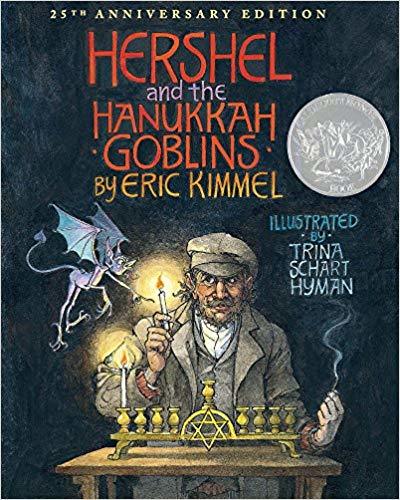 So where did Chanukah fit it? For one thing, when my kids came along I decided not to compete with Christmas. No big gatherings. No tinsel. No horribly unhealthy meals. And no presents. Instead, we turned off the tv, and gathered around to light the candles and stumble through reading the blessings. We’d play dreidel using Chanukah gelt (foil-wrapped chocolate coins) and take turns reading aloud from a collection of funny children’s Chanukah books. The hands-down favorite was Eric Kimmel’s Herschel and the Hanukkah Goblins, although his The Chanukkah Guest came a close second. One of the appeals of Herschel was the way the dialog of the goblins lent itself to silly voices as Herschel outwitted them one by one. Needless to say, the kids loved reading together and playing games as a family. Years later, they told me that they didn’t want to give the impression they didn’t like getting presents for Christmas but they liked Chanukah better.
So where did Chanukah fit it? For one thing, when my kids came along I decided not to compete with Christmas. No big gatherings. No tinsel. No horribly unhealthy meals. And no presents. Instead, we turned off the tv, and gathered around to light the candles and stumble through reading the blessings. We’d play dreidel using Chanukah gelt (foil-wrapped chocolate coins) and take turns reading aloud from a collection of funny children’s Chanukah books. The hands-down favorite was Eric Kimmel’s Herschel and the Hanukkah Goblins, although his The Chanukkah Guest came a close second. One of the appeals of Herschel was the way the dialog of the goblins lent itself to silly voices as Herschel outwitted them one by one. Needless to say, the kids loved reading together and playing games as a family. Years later, they told me that they didn’t want to give the impression they didn’t like getting presents for Christmas but they liked Chanukah better.As the kids grew up, and I divorced and later remarried, I found myself re-evaluating the holiday. I hadn’t celebrated it as a child and I no longer had children to delight. By this time, my own Jewish identity had become increasingly important to me. What did this holiday mean, beyond a way of enjoying the winter in a non-specifically-Christian way?
I started reading the story behind Chanukah, and that’s when my troubles started.
The history as it’s usually told is fairly straightforward, this version from the website Judaism 101:
Alexander conquered Syria, Egypt and Palestine, but allowed the lands under his control to continue observing their own religions and retain a certain degree of autonomy. Under this relatively benevolent rule, many Jews assimilated much of Hellenistic culture, adopting the language, the customs and the dress of the Greeks, in much the same way that Jews in America today blend into the secular American society.
More than a century later, a successor of Alexander, Antiochus IV was in control of the region. He began to oppress the Jews severely, placing a Hellenistic priest in the Temple, massacring Jews, prohibiting the practice of the Jewish religion, and desecrating the Temple by requiring the sacrifice of pigs (a non-kosher animal) on the altar. Two groups opposed Antiochus: a basically nationalistic group led by Mattathias the Hasmonean and his son Judah Maccabee, and a religious traditionalist group known as the Chasidim, the forerunners of the Pharisees (no direct connection to the modern movement known as Chasidism). They joined forces in a revolt against both the assimilation of the Hellenistic Jews and oppression by the Seleucid Greek government. The revolution succeeded and the Temple was rededicated.
According to tradition as recorded in the Talmud, at the time of the rededication, there was very little oil left that had not been defiled by the Greeks. Oil was needed for the menorah in the Temple, which was supposed to burn throughout the night every night. There was only enough oil to burn for one day, yet miraculously, it burned for eight days, the time needed to prepare a fresh supply of oil for the menorah. An eight day festival was declared to commemorate this miracle. Note that the holiday commemorates the miracle of the oil, not the military victory: Jews do not glorify war.
Unpacking that a bit, the history is usually framed as a victory for freedom of religion (“they oppressed us, defiled the Temple, etc., but we resisted and triumphed, so now we get to worship in our own way”) with the miracle of the oil lasting 8 days as proof of divine approval. As one season after another rolled around, I felt increasingly uneasy about this. I didn’t see how this was not glorifying war (see the last sentence in the article above) by celebrating a military victory. I couldn’t understand how you could reasonably separate the “miracle” of the oil and the “we took back our Temple by force of arms.” Not persuasion, not diplomacy, not compromise. Not libertarian “do you your thing.” Not even voting on the issue.
Brute strength.
This did not sit well with me. For one thing, setting aside my commitment to nonviolent solutions, it means that if one side were winners, the others lost. People aren’t thrilled about losing, by the way. The feelings fester into resentment and the thirst for retribution. Every 3 year old knows this.
Then I started considering those losers, those soldiers dying far from home. Not being a scholar of Greek history, I don’t know if they had a choice to enlist, or if they did so out of loyalty or from hope of a better life. I did know I didn’t feel good about celebrating their deaths. I couldn’t escape the connection. Sometimes it felt as if I were lighting candles for the peace of their spirits.
Matters got even worse when I looked even more carefully at the story. I began to see the conflict not as Greek oppressors versus those who sought only to worship as they chose. It was a conflict within the Jewish community between hard-liners who wanted to keep all the power within the priestly caste and those who saw commonality and good in the world in which they were increasingly assimilated. I suspect the heads of the Maccabees would explode if they knew how many modern Jews also practice Buddhist meditation, yoga, or celebrated…Christmas.
At this point, I’d like to say a few more words about Christmas. It’s nigh onto impossible to ignore, growing up in a Western country. I’ll set aside the pagan (or not) origins of many of the traditions and just say that much of the holiday has little or anything to do with practicing Christianity. I love the music and the foods and the fragrances (fresh-cut pine trees! oranges stuck with cloves! hot cider with cinnamon sticks! clove-scented ribbon candy!). I love that the ideal is for us to set aside our differences in the spirit of “peace on earth and good will toward all.” I loved walking through gently falling snow, serenading the faculty members of my college, each singer holding a lighted candle.
In fact, I love the idea of lighting candles in the darkest time of the year. I cherish things that bring us together instead of separating us. This is not to say that all of us must be alike. Each family’s, community’s, ethnicity’s particular history has its own unique value. I just don’t want to be jumping up and down for joy because my “side” won.
There’s a deeper issue here, which is Who has the power? Who is making the rules? A small group of priests (men, of course) who want things done the way they always have been? The pioneers and experimenters who answer to their own consciences? We ourselves, flawed and imperfect as we are? One of the many things I appreciate about modern Judaism is the insistence upon finding our own understanding (“Two Jews, Three Opinions”).
Well, my opinion is that I get to make up my own mind how to celebrate Chanukah.
During this personal journey, an image that recurred to me came from the television series Babylon 5. At the end of the second season, as the Shadows are closing in and the future looks grim, Susan Ivanova stands in a darkened room, lighting Chanukah candles. She was not just one Jewish woman, she was me. She was all of us, yearning for hope in dark times and bringing tiny points of light into a troubled time. The more I thought about it, the more this image helped me to reclaim Chanukah. It doesn’t have to be about “the miracle of the oil” or the victory of the Maccabees. It can be whatever is meaningful to me. That’s the “free to worship as we choose” part.
So this year I lit candles with my family and contemplated the wiliness of Herschel of Ostropol in outwitting the Goblin King and all his hench-goblins. I will greet my gentile friends with whatever holiday wishes they like. I give myself permission to enjoy it all.
If there is a miracle for me in Chanukah, it’s the resilience of the human spirit and our ability to take a difficult passage and find in it a message of universal hope.
November 26, 2021
Short Book Reviews: A Transgender Heroine Defends Her Homeland
Gifting Fire, by Alina Boyden (Ace)
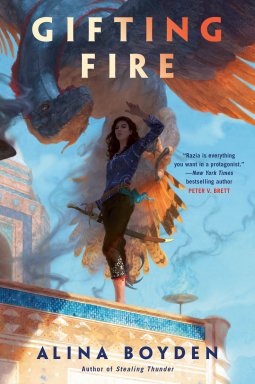
I enjoyed this sequel to Alina Boyden’s wonderful debut fantasy novel, Stealing Thunder, for many reasons. With power and authenticity, the story of her heroine, Razia Khan, a transgender royal who ran away from unendurable abuse to work as a prostitute thief, find true love, rescue her feathered-dragon zahhuk, and discover her military genius, came alive. If Stealing Thunderwas about discovering who you really are and being willing to fight for yourself, Gifting Fire elaborates that theme, centering on creating community and loyalty. Both stories are set in an alternate pre-Raj India, a refreshing departure from the usual Western European fantasy worlds. In our world, as in Boyden’s, transfeminine people called hijras have recognition, joining together in communities, even if as individuals they are rejected and scorned.
Razia has finally created the life she longed for, as a princess cherished by her soulmate, Prince Arjun, guardian to her sister-hijras, whom she deeply loves. But such bliss cannot endure. Her ambitious father, having maneuvered her into the governorship of an unstable province, Zindh. He now joins forces with her childhood nemesis, Prince Karim, who brutally raped her as an adolescent. In order to save her prince and his city from certain destruction, Razia agrees to marry Karim. Soon she is imprisoned in the women’s quarters at Karim’s palace, her good behavior ensured by threats against her sister-hijras whom he holds hostage. All is not lost, however, for Razia has now found a community of empowered transgender women, led by the rightful ruler of Zindh. It will take all of Razia’s military brilliance and courage to organize a successful conquest while playing the part of a submissive bride.
Boyden brings an unusual sensitivity to her portrayal of Razia, not as a stereotype or object of curiosity defined only by her gender identity, but as a person discovering her strengths in an often hostile world. Highly recommended for all fantasy readers. For anyone interested in positive portrayals of transgender characters, defined by much more than their gender, these two books are a treasure.
November 22, 2021
Memoir, Cancer, And Tent Camping: My Friend Connie
When a friend or family member is diagnosed with cancer, the effects ripple through the community. If we and our friend are relatively young, we may feel shock but also a sense of insulation. We have not yet begun to consider our own mortality, or the likelihood of losing our peers to accident or one disease or another. It hasn’t happened to us yet and the odds are still in our favor, particularly if we don’t smoke or drive drunk, we exercise and eat many leafy green vegetables. As the years and the decades go by, most of us will see an increase in morbidity if not mortality in our friends. They – and we – may develop osteoarthritis or Type 2 diabetes, high blood pressure, high cholesterol, all those common ailments of aging.
Some of us will get Covid-19. Some of us will get cancer.
When my best friend, Bonnie, was diagnosed with ovarian cancer, she was the closest friend I had who had cancer. Since then, other friends have been diagnosed and some have died; Bonnie died in 2013 (peacefully, at home). One of the things Bonnie did way back when was find support groups for women with cancer. Maybe it’s a holdover from the consciousness-raising groups of the 1970s, but it’s practically a reflex: whatever is going on in your life, you grab a bunch of women to talk it through. Do men do this, too? If so, it’s a secret from me.It turned out that a cluster of women who were at college with us at the same time and who still lived in the area wandered through these groups at one time or another, or were otherwise associated with this community. Some have also died, some weren't doing too well the last I heard, and some are thriving. One of those I lost was my friend, Constance Emerson Crooker.
Connie and I weren’t close in college, but it was a small school and everybody pretty much knew one another in passing. She wasn’t an avid folk dancer or a Biology major like me, but she and Bonnie stayed in touch so I’d hear about her from time to time. Connie was one of those who stepped up to the plate in Bonnie’s final weeks, and I was not only grateful for the extra and very competent pair of hands but for the chance to get to know her better.
Connie was a long-term melanoma survivor, a “late-stage cancer patient,” and made no bones about being one of the lucky ones.
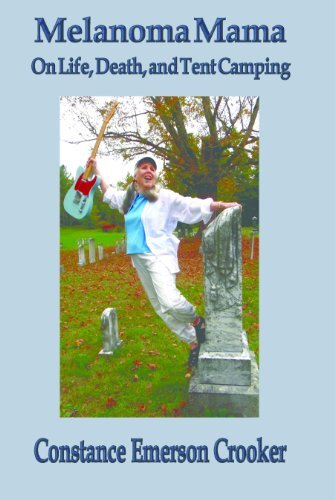 One of the things Connie did was to go tent camping across America. Another thing was to write about it and her cancer. I slowly read and savored her memoir, MelanomaMama: On Life, Death, and Tent Camping. Tent camping does not rank high on my list of favorite things to do. I didn’t grow up camping, and I’m poor at it at best. But as I wended my way through her breezy story-telling, I realized it didn’t matter whether it was tent camping or ice skating or tango dancing (which Bonnie did, clear through the week she went on hospice) or anything else that gives us intense joy.
One of the things Connie did was to go tent camping across America. Another thing was to write about it and her cancer. I slowly read and savored her memoir, MelanomaMama: On Life, Death, and Tent Camping. Tent camping does not rank high on my list of favorite things to do. I didn’t grow up camping, and I’m poor at it at best. But as I wended my way through her breezy story-telling, I realized it didn’t matter whether it was tent camping or ice skating or tango dancing (which Bonnie did, clear through the week she went on hospice) or anything else that gives us intense joy.William Blake wrote that if a fool would persist in his folly, he will become wise. I think that if we’re blessed to have enough time and reflection we can move through the shock and terror and sheer awfulness to some other place, one of “sucking the juicy joy out of life.” Which is why Connie’s tent camping spoke to me and I’m grateful she wrote her book.
When something awful happens to us or when we at last glimpse it in the rear-view mirror, many of us want to write about it. If we’re fiction writers, we use our imaginations to spin out stories in our preferred genre. A huge weight, a pressure of all the intense experience, the fear, the relief, the unhealed and oozing wounds, cries out for us to make sense of the whole thing. That’s one of the things that fiction does, and often it does it much better than straight memoir narrative. Fiction requires emotional coherence, at least genre fiction does. I make no promises about literary or experimental stuff. We think, If I could just nail this down in a story, it would make sense. I understand that longing, that temptation, and at the same time, in my own life, I’ve had the good fortune to pay attention to my gut feeling that I wasn’t ready. Maybe I’ll never be ready to “tell my story.”
But Connie was and she did, with wit and the ferocious clear-sightedness of one who knows she has been reprieved and what it has cost her. Some parts are travelog, some parts are survivalog, some are the observations of an intelligent, thoughtful person who has had a long time to decide how she wants to live each day. I couldn't read very much of it at a time; it was too “chewy,” too emotionally dense. I needed to reflect on what she shared and what it meant in my own life.
In Connie’s writing, I recognized something quite different from the impulse to tell our story to make sense out it. It was the even more powerful need to take what we have suffered and have it make a difference. Have our lives make a difference.
“Hey world,” she seems to be saying, “I was here. Me, the only Connie there is or will ever be.”
“So now, I’m back to scans every three months. Watch and wait. Watch and wait. Wait for the pink and turquoise sneaker to drop. But I keep enjoying my miraculous recovery.
“When I say miraculous, I don’t mean a conventional miracle. … It’s miraculous that a Monarch butterfly can wing its way from Canada to one small patch of breeding ground on a Michoacan hillside. It’s miraculous that a black hole’s sucking gravity can pull everything, including light into is gaping maw. It’s miraculous that there are billions of stars in our galaxy and billions of galaxies in our universe…
“And I’m still here, gazing with wonder at it all.”
And sharing that wonder with us. Thanks, Connie, wherever you are tent-camping now.
November 19, 2021
Very Short Book Reviews: Children of the Secret Laboratory
 Refraction, by Christopher Hinz (Angry Robot)
Refraction, by Christopher Hinz (Angry Robot) A generation ago, a handful of babies in a secret laboratory were exposed to a mysterious, possibly extraterrestrial material and then placed with normal families and observed. Aiden Manchester is one such child, now grown. He’s ignorant of his origins but beset by an uncontrollable and rather disgusting talent for manifesting piles of sticky brown goo when he sleeps. His otherwise placid life is upended by the search for the other children, as well as the scientists that experimented on them, a search that quickly twists the story into a thriller when he’s kidnapped by one of the other kids. That one is a homicidal psychopath, by the way, bent on eliminating all the others, who each have a unique gift and piece of the puzzle.
Aiden makes allies of varying degrees of ferociousness and competence along the way, although their goals are never precisely aligned with his. This is a refreshing change from the common “fellowship” quests, where everyone wants the same thing and always acts in unison. I honestly did not see where the story was headed. It’s a wild ride with a likeable hero who in the end uses his wits and insight against villainous treachery. For me that’s a sure formula for success!
November 15, 2021
Transgender and gender diverse teens: How to talk to and support them
Transgender and gender diverse youth have become more visible than ever. How does transgender history inform us about where society is at in the United States?
Jules Gill-Peterson: A lot of the rhetoric around [trans] kids frames them as totally new – most people are getting to know that there are trans youth for the first time. The visibility that we’re dealing with today is pretty unprecedented. But that doesn’t mean [transgender] people themselves haven’t existed before.
One of the challenges that anyone who’s trans faces is coming to an understanding of yourself in a culture that fundamentally doesn’t recognize that you exist. One of the most remarkable things about trans youth is that they’re able to stand up in this world that we’ve created, that gives them no reason to know who they are, and say, “Hey, actually, I know something about myself that none of the adults in my life know.”
I think history can be a really powerful grounding force to give young people a sense of lineage. It’s not like you look back in time and you see yourself reflected, by any means. But I think it can be profoundly reassuring, in a moment of not just political backlash but the general isolation that trans people face in a cis-normative society, to be able to [see] that you’re not the first person to ever go through this. [I think] that is just kind of a powerful message and one that I certainly subscribe to as an adult too, but I can imagine it’s especially important for young people.

What does “cis” mean and where does it come from?
Jules Gill-Peterson: This is actually a term from chemistry. It’s a prefix that you can put in front of words. So is the word “trans.” Trans as a prefix means across – it’s the spatial metaphor moving across something. Cis means on the same side of. At some point on the internet, people started using that word; they were looking for a word to distinguish between people who are trans and people who are not. Cisgendered came to mean that your gender identity matches what was assigned at birth. That being said, it’s not a totally kind of innocent or uncomplicated term. I’m not sure how helpful it is to think of cisgender as something that people need to own up to, for example, in a pronoun circle (when people introduce themselves by name and by the pronouns they prefer).
I think often the pressure for people to [identify] as cis doesn’t make any sense, either. It’s like, well, what makes you cisgender? Did you really go through that long process of deciding if your gender matched what’s on your birth certificate, like trans people have to deal with? I tend to use the word cis in my work to describe large historical structures that created that very obligation in the first place.
Kacie Kidd: To build off that, we as a people have a tendency to put people in boxes. And I’m sure that many of us have had the experience of not neatly fitting into a box that society ascribed to us. And I think that’s something that we all can connect to, and relate to, and understand that our job of putting people in boxes is not helpful, right? And there is no binary for most things, if not all things, and I think our realization of that helps to understand the broader [situation].

What are binders and gender-affirming procedures, and is there a right age for them?
Kacie Kidd: A binder is a garment that constricts chest tissue and has a variety of uses; elite athletes often use similar kinds of products. But [binders] can help make someone feel more in line with who they are and can help them kind of navigate the world. But the answer to your question is no, there isn’t a perfect age. But these are long, thoughtful conversations and considerations.
Jules Gill-Peterson: As a historian of medicine, one of the really interesting stories that I pulled in my book, Histories of the Transgender Child, for example, is that gender affirming medicine originated long before it was seen as gender affirming. The medical techniques used now came out of studying trans and intersex people and under really horrific, barbaric, torturous conditions. But the goal of that research was actually not to help intersex and trans people – it was to force them to appear more “normal,” but actually developed means to medically intervene into human sex and gender.
One of the interesting truths here is that there really isn’t that much of a meaningful difference. The only difference between trans medicine and non-trans medicine is who gets stigmatized for it. Who has to go get a psychiatric letter of evaluation, who has trouble getting insurance compensation? [For example,] who uses the most hormones in this country? Cisgender women and cisgender men. They just don’t have to ask for it as much. Other kinds of surgeries that are exactly the same as gender affirming surgeries are called cosmetic surgeries.
I worry about my trans daughter having regrets in the future, when going back won’t be an option.
Jules Gill-Peterson: I understand the anxiety, but I want to make the case that [regret] is a red herring that’s been planted in our mind. I think the concept of regret is often tied to this idea of “de-transitioning,” the idea that you can transition and then un-transition, which is not a very good way of thinking about it. When people do choose to de-transition, especially trans women, it is due to overwhelming social pressure discrimination and loss of social support people.
People de-transition when they lose their jobs, when their partners abandon them, when their families won’t speak to them, when they’re in dire financial straits, when they’re experiencing street harassment and criminalization, and when they don’t have the material resources they need to live. Those are the most concerning regrets.
Our children’s genders aren’t something that belong to us, right? And so our job is to support them in life and try to avoid those regrets, or to avoid the regret of going through puberty you didn’t want to go through, or having to, you know, spend years pretending to be someone you [are not]. I think those are things we should feel regretful for in society.

The Conversation U.S. on Oct. 21, 2021, hosted contributors Jules Gill-Peterson, an associate professor of history at Johns Hopkins University, and Dr. Kacie Kidd, medical director of the pediatric Gender and Sexual Development Clinic at West Virginia University Medicine Children’s Hospital, in a webinar titled “Transgender and gender-diverse teens more visible than ever: Who they are, what they need and how to talk about sensitive issues.”
This article first appeared in and is reprinted under Creative Commons license.
November 12, 2021
Very Short Book Reviews: Marjorie Liu's Delicious Collection
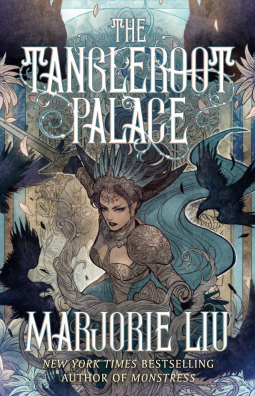
The Tangleroot Palace, by Marjorie Liu (Tachyon)
This collection was my introduction to the work of Marjorie Liu. I found the stories oddly disquieting while I was reading them but Liu’s skill was so evident, I trusted it all to come together and I was not disappointed. I didn’t like all the stories equally, but that’s to be expected in any assortment of short fiction. These feel as if they’re paced like novels, but I think that’s because of the unusually subtle ways Liu weaves together the various fictional elements. Her work reminds me of that of the late Phyllis Eisenstein, who told emotionally complex, sophisticated stories with simple language. Here the real story lies beneath the mechanics of prose and plot, each thread of the tapestry contributing to a gorgeous and emotionally satisfying whole. And the last piece, a novella that gives its name to the collection, is just jaw-droppingly awesome.
November 5, 2021
Book Reviews: More Magical Rome
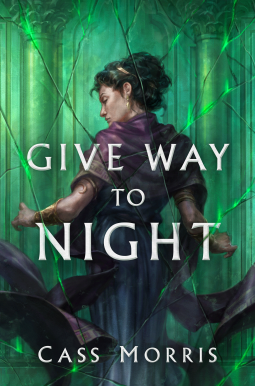
Give Way to Night, by Cass Morris (DAW)
Rome with magic, how cool is that? In this second volume of “The Aven Cycle,” Aven (aka Rome) is beset by enemies both within and without. Iberian tribes are wielding blood magic against Avenian-held territory, and Sempronius Tarren, our hero from the first volume, has been dispatched to lift a siege. Meanwhile at home, the Discordian magicians plot the city’s ruin through the ascendency of chaos. Latona, along with Sempronius’s prickly sister, Vibia, must discover who’s behind the attacks and stop their dastardly plots.
As with the first book, this is a long, intricately detailed story involving a huge cast of characters (and the author has thoughtfully provided a list, arranged by nationality and family affiliation). The pace varies from dramatic battle scenes to quiet domestic affairs. The threads of plot, character development, relationship, magic, and culture clash are so skillfully handled that each individual scene adds another layer to the tapestry. I especially liked the way the love story between Latona and Sempronius unfolded even though they were many miles apart and each growing in their own way. The descriptions of battle tactics, especially Roman discipline against wild magic, were both vivid and insightful (yep, there’s a reason Rome conquered most of Western Europe). Characters discover clues about the plot underlying the encroaching chaos in much the same way people do in real life, slowly putting together a pattern while desperately beating back the most dangerous manifestations.
Magic in this world comes in different flavors that reflect the distinct cultures. I explored this aspect of world-building in my “Seven-Petaled Shield” trilogy where I contrasted the polytheistic, highly structured magic of my version of Rome with scripture-based, story-based magic of ancient Judea, and both with the expansive nature-based magic of my steppe horse nomads. Morris pits the magic of her version of Rome, with temples and deities, against the blood-fueled magic of the Iberian tribes, with great success.
I strongly suggest that the reader begin at the beginning of this long “cycle” (Give Way to Nightis only the second installment and there’s more to come). Although Morris provides plenty of references to what has come before, there’s simply too much backstory and previous character development for most of us to jump easily into the middle. And the world and its characters are so appealing, you won’t want to miss out on how it all started!




